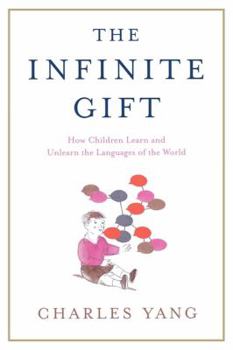The Infinite Gift: How Children Learn and Unlearn the Languages of Th
Select Format
Select Condition 
Book Overview
A child's very first word is a miraculous sound, the opening note in a lifelong symphony. Most parents never forget the moment. But that first word is soon followed by a second and a third, and by the age of three, children are typically learning ten new words every day and speaking in complete sentences. The process seems effortless, and for children, it is. But how exactly does it happen? How do children learn language? And why is it so much harder to do later in life? Drawing on cutting-edge developments in biology, neurology, psychology, and linguistics, Charles Yang's The Infinite Gift takes us inside the astonishingly complex but largely subconscious process by which children learn to talk and to understand the spoken word. Yang illuminates the rich mysteries of language: why French newborns already prefer the sound of French to English; why baby-talk, though often unintelligible, makes perfect linguistic sense; why babies born deaf still babble -- but with their hands; why the grammars of some languages may be evolutionarily stronger than others; and why one of the brain's earliest achievements may in fact be its most complex. Yang also puts forth an exciting new theory. Building on Noam Chomsky's notion of a universal grammar -- the idea that every human being is born with an intuitive grasp of grammar -- Yang argues that we learn our native languages in part by unlearning the grammars of all the rest. This means that the next time you hear a child make a grammatical mistake, it may not be a mistake at all; his or her grammar may be perfectly correct in Chinese or Navajo or ancient Greek. This is the brain's way of testing its options as it searches for the local and thus correct grammar -- and then discards all the wrong ones. And we humans, Yang shows, are not the only creatures who learn this way. In fact, learning by unlearning may be an ancient evolutionary mechanism that runs throughout the animal kingdom. Thus, babies learn to talk in much the same way that birds learn to sing. Enlivened by Yang's experiences with his own young son, The Infinite Gift is as charming as it is challenging, as thoughtful as it is thought-provoking. An absorbing read for parents, educators, and anyone who has ever wondered about the origins of that uniquely human gift: our ability to speak and, just as miraculous, to understand one another.
Format:Paperback
Language:English
ISBN:1451612990
ISBN13:9781451612998
Release Date:July 2010
Publisher:Scribner Book Company
Length:288 Pages
Weight:1.15 lbs.
Dimensions:0.7" x 6.0" x 9.0"
Customer Reviews
5 ratings
A captivating read.
Published by Thriftbooks.com User , 16 years ago
Despite my own lack of linguistic training I did not find this dry. The writer has an engaging, conversational style, and makes the technical aspects accessible to all. (If you can make tree-diagrams seem compelling, you have achieved something special.) A good book for parents curious about language development, and amateur-linguists alike.
Overview of current research on language acquisition
Published by Thriftbooks.com User , 17 years ago
The book interprets the current research on language acquisition for the non-academic. There is a lot of meat here. While it's presented in a very readable way, it is not for the casual reader. It gave me a better understanding of how grammar as an organizing concept plays out in first language development and once established provides impediments to learning subsequent languages. For someone interested in languages, there is a lot of food for thought, such as the compounding of words in Eskimo and that the vowel shift that we see in the US is also observable in the speeches of Queen Elizabeth II. The last chapter on the superiority of the German language lost me. As a non academic, I don't have the tools to refute the thesis. It would seem, though, that even on the hypothetical desert island, to predict the surviving language, more variables than grammar should enter into the equation. English (a grammatical child of German) did survive Latin and French on the Islands of Great Britain. I'd be interested in a discussion of the commonly considered factors (adaptivity, King Alfred, literature, etc) against grammar.
Great book about language acquisition
Published by Thriftbooks.com User , 18 years ago
This is a great book if you want to have an informed view while you watch your (grand)children learn their native language. It is fascinating to watch children do just what current theory says they will do! This book is mainly for people who are used to thinking about technical and abstract stuff. I already knew a little about the subject and found the book at just the right level -- the author communicates the basic ideas but does not get bogged down in excessive detail.
Original insights into great human mysteries
Published by Thriftbooks.com User , 18 years ago
In this wonderfully readable and compelling book, Charles Yang, a noted professor of linguistics now at Penn, uses evidence from children's babbling, biology, neuroscience, and historical literature to provide deep insights into the nature and origin of language and how children accomplish the remarkable feat of learning a language. The book is clearly written and understandable to a broad audience, and poses and answers some of the key questions about understanding what makes humans unique.
How kids learn language--and how Chomsky thinks about it
Published by Thriftbooks.com User , 18 years ago
This is the book to read for a clear and deep and ORIGINAL account of how children "learn" language. It is also by far the best accessible account to the linguistics of Noam Chomsky, an intellectual accomplishment that has spread to many other fields, and whose excitement Yang communicates very well.






